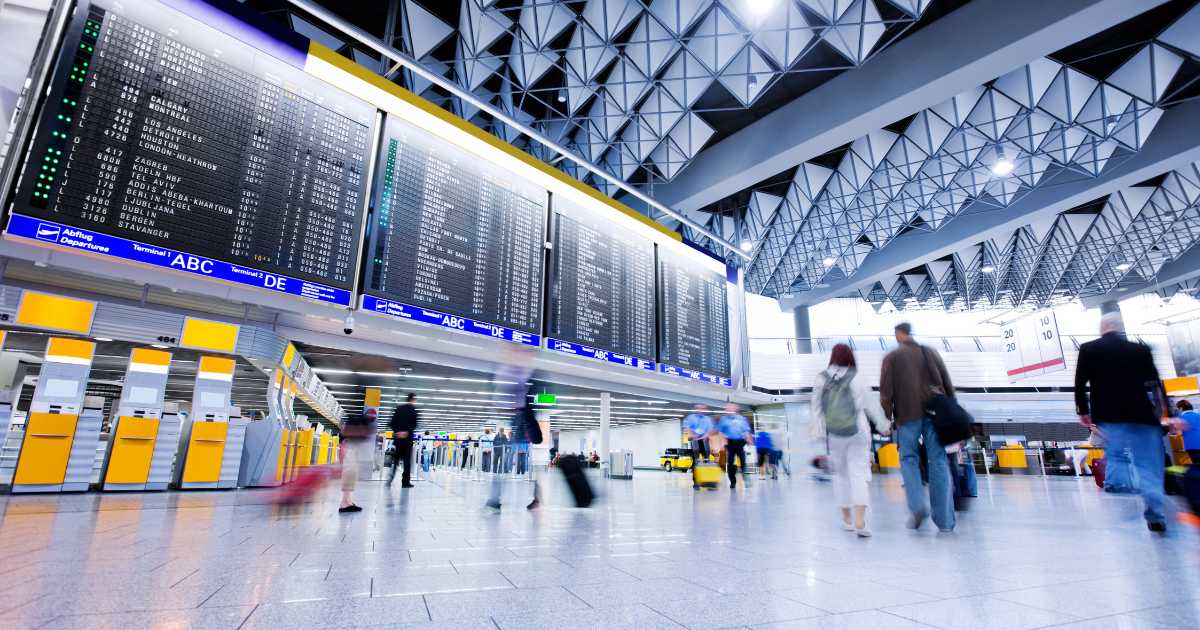
March 17, 2025
How AI is Revolutionizing Personalized Travel Experiences
Author:

CSO & Co-Founder
Reading time:
8 minutes
In a perfect world, you would wake up to a notification that flight prices to Barcelona just dropped 30% for your preferred travel dates next month. But how did they know you’ve been daydreaming about Spain?
Well, you may not know, but smart AI has been quietly noting your travel searches, Instagram likes and even how long you lingered on those beach photos.
This unveils the exciting truth – we’re moving beyond the era of “people who liked this also liked that” into a world where travel experiences are as unique as your fingerprint. Your Barcelona won’t be anyone else’s Barcelona, and that’s exactly the point.
AI-Driven Personalized Travel Planning
AI smart tools learn your style by watching what you click, where you’ve been, and what similar travelers enjoyed.
Unlike travel agents with limited options, it scans thousands of possibilities in seconds to match your unique preferences. Skip past those museum suggestions and linger on food tours? The system notices and adjusts immediately.
The best part is that the more you use it, the better it gets at finding those perfect hidden gems you may never discover on your own.
One of the main examples of using AI for personalized travel planning is AI Trip Planner used by Booking.com. The tool, powered by ChatGPT, generates custom travel itineraries based on user preferences, making it easier for travelers to find the best accommodations and experiences without extensive research. [1]
The AI suggests daily plans considering the destination, travel dates, and user interests, ensuring travelers get recommendations that align with their expectations. Unlike third-party planners, it connects directly to booking systems, allowing users to go from planning to reservation in just a few clicks.
AI-Powered Chatbots and Virtual Assistants
Remember when changing your flight meant waiting on hold for 45 minutes? Those days are disappearing thanks to AI travel assistants that are actually helpful. These smart chatbots aren’t the clunky “press 1 for reservations” systems of yesterday.
The game-changer is that these digital helpers never sleep. Jet-lagged at 3 AM in Tokyo and need to modify your hotel reservation? Your AI assistant is ready to help while the rest of the world (and all the call centers) are fast asleep.
What’s really impressive is how these systems understand what you’re asking, even when you’re typing frantically because your gate just changed. They can tell the difference between “I want to fly to Portland, Maine” and “Portland, Oregon” without making you repeat yourself or navigate frustrating menus.
For travel companies, these digital assistants handle thousands of routine questions, freeing up human agents to solve the truly complex problems that require a personal touch – all while saving on operational costs.
For instance, developed for Edwardian Hotels London chatbot Edward is an innovative virtual assistant that communicates with hotel guests via SMS. It assists with reservations, provides information about hotel amenities, and supports over 1,200 different guest service requests. If unable to resolve an issue, Edward seamlessly redirects inquiries to the appropriate hotel staff. [2]
The owners claim that it delivered tangible business benefits:
- 10-50% increase in room service sales
- 30,000 guests from 99 countries, communicating in 59 languages
- 69% of guest inquiries handled automatically – saving approximately 95 workdays in 2019

Read more: AI in the Aviation Industry: Top 5 Use Cases

Dynamic Pricing and Revenue Optimization
Travel companies now use AI to adjust prices of flights based on what’s happening right now – how many people want to book, what competitors are charging, and even things like weather or local events.
Airlines, hotels, and rental car companies can make more money while still keeping their prices competitive. The AI looks at tons of past booking information and customer habits to predict when demand will go up or down.
This helps travel businesses avoid losing money during slow times while making the most of busy seasons. Both companies and travelers win – businesses earn more, and customers pay prices that actually match what’s happening in the market instead of fixed rates that don’t change.
Enhancing In-Destination Experiences
When you’re exploring a new place, AI now helps you find great spots to visit, eat and discover local secrets based on what you like and where you are at that moment.
Travel apps can now switch up their suggestions if it starts raining, if you’re in a different mood, or when there’s a local festival happening nearby, and they can provide real-time recommendations, augmented reality (AR) navigation or AI-powered language translation.
Plus, you can just point your phone at a building or landmark, and AI will tell you its history or give you a guided tour right then and there.
All these new tools are making travel more exciting, easier to navigate, and more enjoyable than ever before.
Predictive Analytics for Smarter Travel
Travel businesses can now predict what you’ll need before you even ask, thanks to AI analyzing patterns in data. This smart technology looks at flight history and current conditions to warn you about possible delays before they happen.
Travel agencies and hotels are using these tools to spot upcoming trends, allowing them to update their offerings before everyone starts booking. The AI can recommend different routes when traffic looks bad, suggest tourist spots that aren’t packed with people, and even give you safety advice tailored to your specific trip.
Airlines, for example, leverage AI-driven predictive analytics to enhance efficiency and improve passenger experience. By analyzing vast amounts of flight data, weather patterns, and operational schedules, AI can anticipate potential delays, optimize routes, and improve baggage handling.
The collaboration between SITA and Addepto resulted in the development of an Intelligent Tracking System for luggage recognition and a Digital Twin to monitor real-time airport activities. By integrating computer vision technology, these systems provide real-time operational information, improving decision-making processes and passenger experiences.

Read more: AI-Based Luggage Tracking System and Digital Twin

AI-Optimized Process Automation
Travel businesses are using AI to handle routine tasks, which makes everything run smoother while saving money. From automated check-ins at hotels to AI-powered booking systems that predict and adjust room availability, AI is optimizing logistics behind the scenes. Large-scale data processing capabilities enable AI to handle thousands of queries simultaneously, reducing wait times and enhancing customer satisfaction.
Additionally, AI-driven CRM (Customer Relationship Management) systems help businesses track customer preferences, ensuring personalized engagement and retention.
By letting AI handle the repetitive work, travel staff can focus on providing better service while avoiding the mistakes that happen with manual processing.
And that’s exactly what Dorchester Collection has done, by leveraging AI to analyze guest feedback and sentiment, uncovering key stress points in wedding planning. Their Metis AI platform identified that while the number of weddings increased, revenue remained stagnant due to a lack of personalized experiences.
Moreover, it collaborated with print vendors and luxury bridal salons to offer tailored services and even created family trees for VIP treatment and personalized interactions. [3]
Challenges and Ethical Considerations
While AI offers remarkable benefits, it also introduces significant challenges that must be addressed for ethical and responsible deployment.
Data Privacy and Security
AI systems rely on vast amounts of personal data, including passenger itineraries, payment details, and travel preferences. The challenge lies in protecting this sensitive information from cyber threats and unauthorized access.
Solution: Companies must implement robust cybersecurity measures, including encryption, multi-factor authentication, and compliance with regulations like GDPR and CCPA to safeguard customer data.
Algorithmic Bias and Fairness
AI-driven systems, such as dynamic pricing in airlines or hotel booking platforms, can unintentionally introduce bias, leading to unfair pricing or service discrepancies for certain customer demographics.
Solution: To mitigate bias, companies should regularly audit AI algorithms, diversify training data, and establish fairness benchmarks to ensure equitable treatment of all travelers.
Transparency and Explainability
Many AI-powered systems, such as airline ticket pricing models or personalized hotel recommendations, function as opaque “black boxes,” making it difficult for customers to understand how decisions are made.
Solution: Businesses should implement explainable AI (XAI) practices by providing clear insights into pricing and recommendation mechanisms, helping to build trust among travelers.
Over-Reliance on Automation
While AI chatbots and self-service kiosks improve efficiency, excessive automation can lead to impersonal customer experiences, especially in high-touch industries like hospitality.
Solution: Companies should adopt a hybrid model, combining AI-powered automation with human interaction for complex service requests, ensuring personalized guest experiences.
Regulatory Compliance
The aviation and hospitality industries operate in a complex regulatory landscape with varying AI governance frameworks across regions. Failure to comply can result in hefty fines and reputational damage.
Solution: Organizations must establish dedicated AI governance teams to monitor evolving regulations and implement adaptive compliance strategies that align with global standards.
To address these challenges, companies must prioritize responsible AI development by enforcing ethical guidelines, ensuring data privacy, and maintaining transparency in AI-driven decision-making. A balanced approach will enable businesses to maximize AI’s benefits while fostering trust and inclusivity in customer experiences.
Conclusion: Finding Balance with AI in Travel Experience
As we’ve seen, artificial intelligence is fundamentally transforming the travel industry, creating experiences that are more personalized, efficient and enjoyable.
However, the most successful travel companies will be those that strike the right balance – using AI to handle repetitive tasks and data analysis while preserving the human touch that makes travel so enriching.
For travelers, this evolution promises journeys that are uniquely tailored to individual preferences, with fewer logistical headaches and more meaningful discoveries. For the industry, it offers new ways to delight customers while operating more efficiently and sustainably.
Sources
- https://www.qtravel.ai/pl/blog/8-przykladow-zastosowania-generatywnej-sztucznej-inteligencji-w-turystyce/
- https://www.qtravel.ai/pl/blog/sztuczna-inteligencja-w-turystyce-kluczowe-korzysci-i-przyklady-zastosowania/
- https://pl.ticketinghub.com/blog/travel-ai-artificial-intelligence-in-travel-and-tourism-industry
Category:





